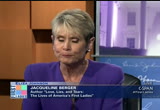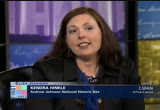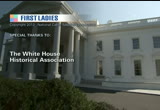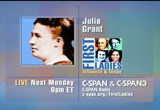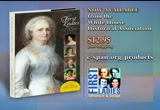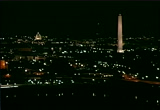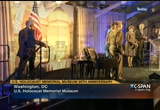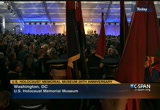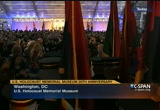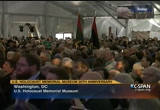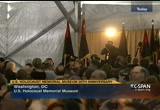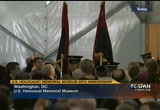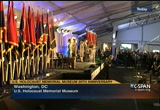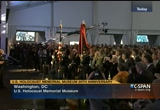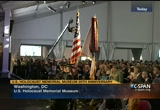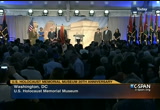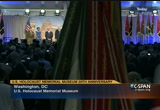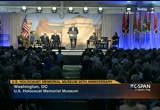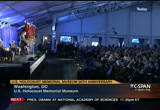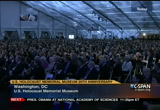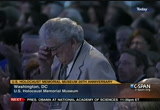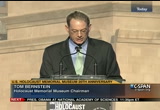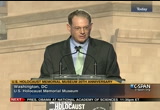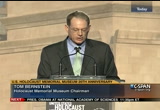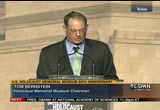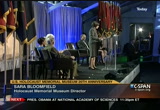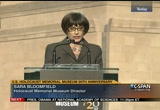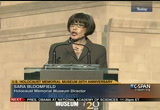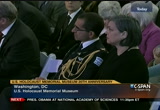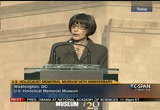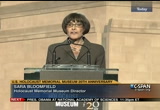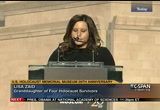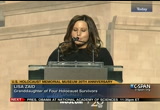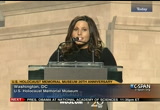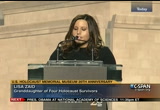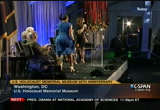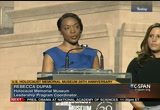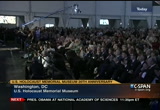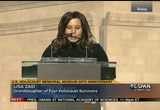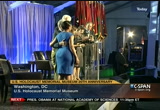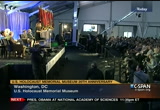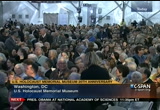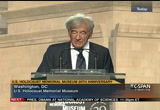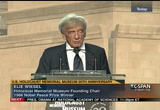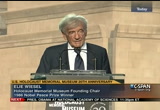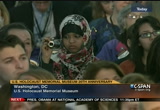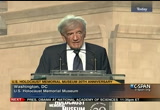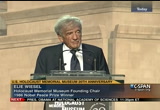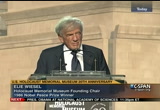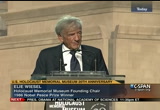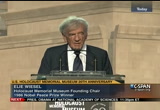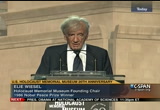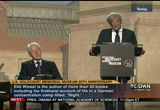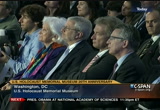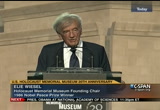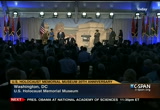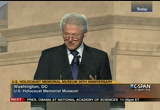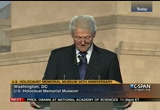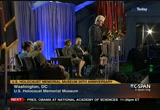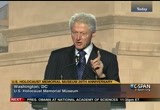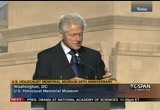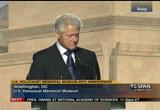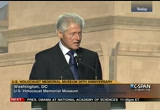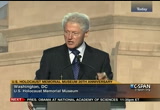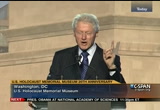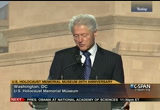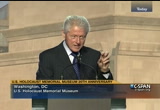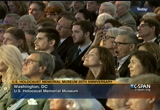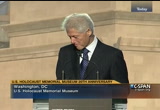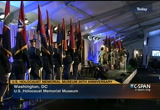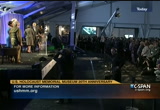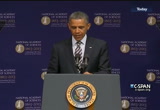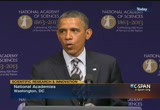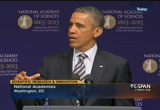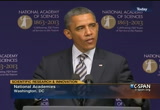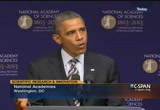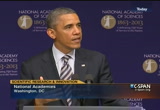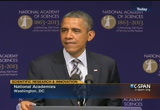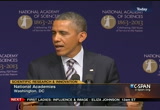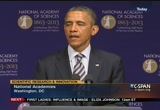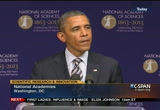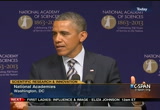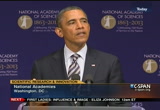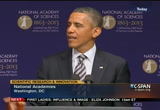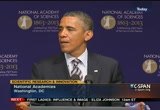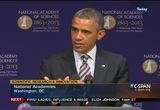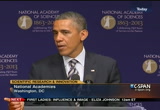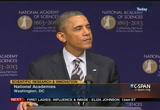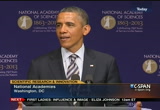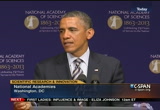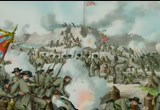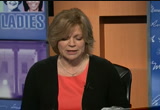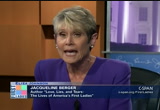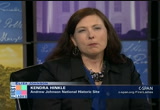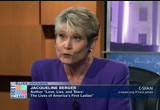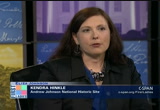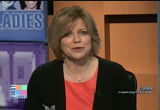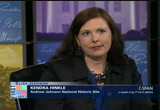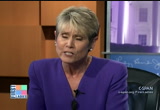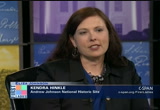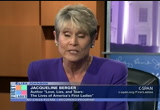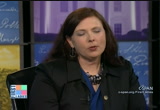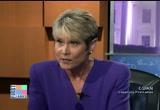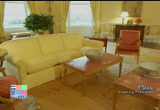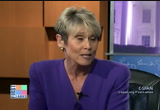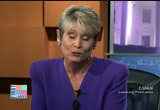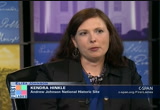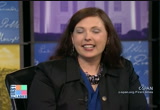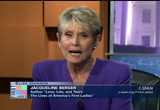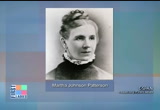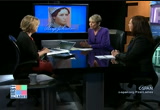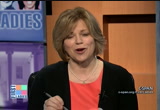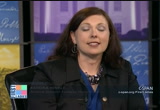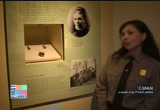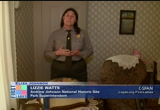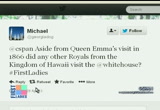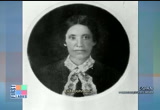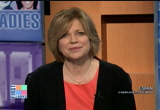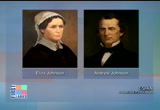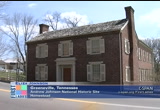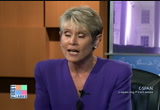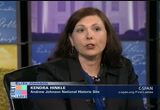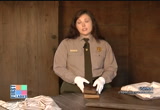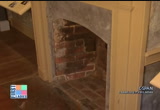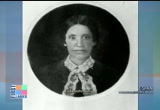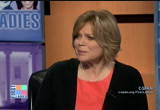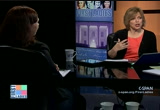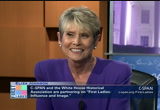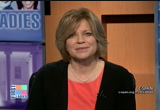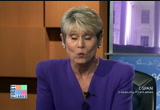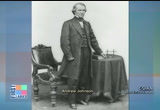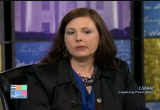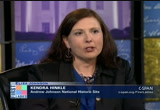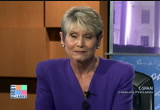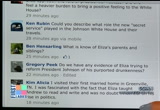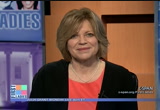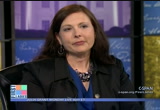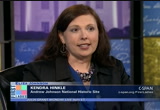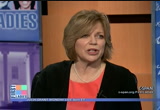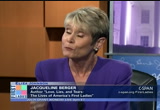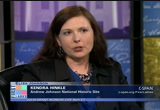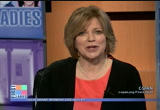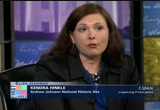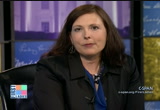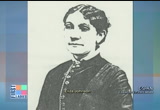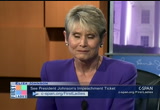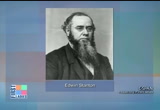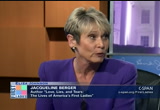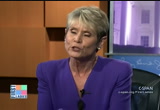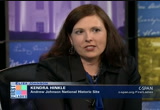tv Politics Public Policy Today CSPAN April 29, 2013 10:30pm-1:01am EDT
quote
10:30 pm
probably one of the most well-liked families that lived in the white house because they were so gracious. they gave of themselves, their time, their energies, their >> he was probably one of the hardest working presidents. once you got him away from politics, he was a good fellow to be around. >> i hope will added a more contoured. presidential pondering. was there any
10:31 pm
has been our partner and will continue through the series. many of the photographs and additions we bring. a special thanks to our two guests. sinces been working at it a teenager bit and jaclyn, her book
10:32 pm
10:33 pm
the presidency and her influence on the image of first lady. julia grant, live next week on c-span, c-span3, c-span radio, and c-span.org. our website has more about the first lady's including a special section "welcome to the white house." it chronicles life in the executive mansion during the tenure of each of you what -- first lady's. the first ladies of the united states." andents from historians michelle obama on the role of first ladies throughout history. now of elbow for a discounted price of -- available for a 95.counted price of $12.
10:34 pm
brought to you as a public service by your television provider. coming up tonight, former at thent bill clinton 20th anniversary of the holocaust museum. after that, president obama talks about investing in science innovation. later, another chance to see first ladies including eliza johnson wife of andrew johnson. former president bill clinton spoke monday at an event marking the 20th anniversary of the holocaust museum in washington dc this is just over an hour. >> ladies and gentlemen, please
10:35 pm
welcome today's honored speakers, the director of the holocaust museum. tom bernstein, chair of the holocaust museum. lisa zaid, a granddaughter of four holocaust survivors. world war ii veteran scottie. the founding chairman of the united states holocaust memorial museum. [applause] and president bill clinton, founder of the clinton foundation and 42nd president of [applause] states.
10:36 pm
10:37 pm
10:38 pm
10:39 pm
10:40 pm
10:43 pm
10:44 pm
10:46 pm
>> please be seated. please welcome tom bernstein, chairman of the united states holocaust memorial museum. [applause] >> good morning and thank you so much for joining us. i have seen these flags many times. the never fail to move me. on this day at this moment in time they are particularly meaningful. they remind is what the museum stands for and what many of you know firsthand, the fragility of freedom and the courage and sacrifice in necessary to preserve it. today these flags also remind us that we are at a turning point. our best teachers are here
10:47 pm
today. we know they're not here forever. fortately, this museum is here forever. [applause] i am so pleased to announce that we give 843 and 130 world war ii veterans with us. [applause] we will pay special tribute to them later. now i want to recognize a few other extraordinary guests. as some of you know, last night we presented the eli wiesel award.
10:48 pm
now here today but with us in. is the grandson of martha sharp who left her children and went to europe as representative of the american unitarian association to establish networks to help jews trying to flee. they secured safe passage for hundreds. next -- [applause] next we have a young man in poland made a possible for several jewish women to hide in a small village, even concealing their identity from his own
10:49 pm
10:50 pm
to all of us. having all of these eyewitnesses reminds us of the many more who are not here today. please stand for a moment of silence in their memory. thank you. be seated, please. we are also delighted to have with us today many institutional partners from all over the u.s. and europe including three senior officials who will be part of a presentation later this morning on holocaust education in their countries. the german defense minister. [applause]
10:51 pm
polish minister of culture and national heritage. [applause] and french ambassador at large for human-rights, francois zimerlay. [applause] it is my pleasure to recognize three individuals who were here 20 years ago at our opening, director sarah bloomfield. [applause] founding chairman and our guiding spirit, elie wiesel and our guest president, bill
10:52 pm
clinton. [applause] we will hear from them shortly. looking out into this crowd, i feel inspired and hopeful. i am inspired by the many young faces. some are descendants of survivors or veterans. many are not. they are here not because of a family connection but because they recognize the importance of our mission for the future and their role in it. the museum's motto is "what you do matters." we know from the holocaust that it is the actions of young people who are the change agents in any society that will shape
10:53 pm
the future. some of my most powerful memories are breaking my three teenage children through the museum and being part of that transformative experience with them. like all kids, they like technology. they realized technological progress must never be confused with moral progress. here they confront profound truths about human nature from the awful to inspirational. here they are prepared along with millions of other young people for their moral responsibilities in an increasingly uncertain future. to guide the future of our museum, i am introduce my dear friend, director sara bloomfield. [applause]
10:54 pm
>> thank you for being here, especially president clinton. we welcome you back. [applause] as we mark this milestone and celebrate the in during continuity of our cause, we are joined again by our visionary leader elie wiesel who is with us on the dedication to decades ago. i'll never forget what he said. standing before thousands, he declared the museum is not an answer. it is a question. with those words, he told the world that the purpose of the museum is not only to reveal the past but to serve as a constant provocation for the future.
10:55 pm
ever since, this place has challenged leaders and citizens, students and teachers from here and everywhere to look inside themselves, to look beyond themselves and to wrestle with some of the most essential issues of human behavior in modern society. to that overwhelming question, does memory have the power to change the world 20 years on? our answer is a resounding "yes." today's new world demands new questions. what will our museum be in the 21st century? how will the holocaust speak across generations? how powerfully will that voice be heard? we believe it history must shape the history yet to be lived. we must never cease to ask the
10:56 pm
hardest question of all, "how was the holocaust allowed to happen?" there are many answers. a shameful event took place 70 ars tght holocaust when representatives of the american and british government met in bermuda to find a solution to the growing refugee problem. the bermuda conference of april 1943 was not the result of nst agr determination to do good or deep concern for jews. it was a show that yielded nothing but an optimistic press release and a dreary bureaucratic report released a month later.
10:57 pm
an american official wrote to the secretary of state "the bermuda conference was an effective. we knew it would be." one headline read "scant hope seen for victims." for those victims a death sentence had been written. at the same time, far from the bright sunshine of that empty spectacle, some of the victims were desperately trying against all odds. the day it opened was the very day the uprising flared across the warsaw ghetto. the jews kept the germans at bay for over a month.
10:58 pm
the allies received news that the above jews has sent a radio message to the west. it ended with two simple words, "save us." that is why this museum sits in the most powerful city in the world. that is why it sits just blocks from the white house and the state department, from the very institutions that failed to save them. this is why it reaches citizens in all 50 states. the holocaust is a story of power. the failure of power held by the allies.
10:59 pm
the unwillingness of t many people everywhere to speak to take a stand, to use their own power as individuals. the abuse of power is just one of the great questions that elie and our other founders envisioned. the museum makes sure that the millions we reach each year will not only look back at the holocaust and ask "what would i have done?" bill will look ahead to dangers unimaginable and ask themselves "what will i do?" we welcome two young women who answered that with impressive zeal. [applause] >> it is my honor to be here
11:00 pm
today. my great-grandfather died trying to save his community during the holocaust. as jews were being deported, and he led a group of 97 people into the forests of poland hoping they might have a better chance to survive. of these 97 people with their entire lives ahead of them, generations of talent, only three survived. one was my grandfather. when he survived, it was the american army who nursed him back to health in a displaced persons camp in germany. to this day the american flag is the largest one in their entire neighborhoods.
11:01 pm
poland will never tell this story. it will never remember the rich and vibrant lives of these individuals. in our country, we built a place of memory. we built in not just for them up for ourselves, for the sake of humanity. when i walked into the holocaust memorial museum and i look at the thousands of photographs we have any million pages of archives and testimony of of veterans and artifacts the rescue, i hear the voice of my family speaking to me as iey are right there next to me. i hear the voices of all of the other families who did not make it saying "you must bear witness and tell our stories."
11:02 pm
i feel a deep sense of commitment and obligation to carry these into the future. on behalf of those who were not here with us to do it themselves. to the survivors who are here today, i promise you this, your lives will always be remembered and honored by us. we will never forget you or the beautiful families from which you came. [applause] the very center of democracy of freedom in the world, you have a permanent home in our museum. we will continue to make your voice is heard by future generations as we have with the
11:03 pm
35 million visitors who have walked through our doors in the last 20 years. to the veterans who are here, i stand before you with the utmost humility and respect. [applause] specifically the granddaughter of auschwitz aq1797 as the number states on my grandmother's arm, i thank you for your bravery and service and not just to this country but to an even higher moral cause, to humanity in general. [applause]
11:04 pm
to ensure these stories like my family is live on it will take many passionate voices. mine will be one. there'll be others. the legacy is an inherited one for me, for rebekah it is a chosen one. she was actively involved in one of the museum programs for high school students and then as a high school english teacher herself she taught the holocaust to her students. today she's a member of the museum staff, bringing holocaust education to young people throughout the country and world. please welcome rebecca. [applause] >> i like to share a poem i wrote for this location.
11:05 pm
i am not the likely voice of a holocaust survivor. i presume that there are more likely torchbearers in the room. one might assume a black woman may not relate to this history. wrong is wrong. in justice speaks values the matter what side of the line you are on. i remember as a student we learned about the holocaust and what appeared to be one day. i was unable to walk away. i saw how little my textbook had to say. for 12 years i resolve to speak out against the evils of this world. in speaking for one i can speak for all. i learned that the evils of this world never sleep.
11:06 pm
i am reminded of martin luther king's dream. i committed to this history with my own students. i make sure they get more than just one day. i give them the lesson of a lifetime. this story is mine. there is no such thing as a likely voice. i must bear witness that silence can never be my choice. thank you. [applause] >> thank you. lisa and i are here to live the lessons of resilience and
11:07 pm
compassion that we learned from holocaust survivors that are here today. >> i will not be here today if it wasn't for the bravery and sacrifice of world war ii veterans who fought so valiantly to liberate europe and a defeat fascism around the world. i invite all of you to join rebeca and me in pledging that we will carry their stories into the future. as a symbol, the museum has created this for you. the significance of these pins is not only to acknowledge what these individuals have been stored, it is also about what we reached and must do for you and our future. president bill clinton will now have the honor of presenting our first 20 the anniversary pin to
11:08 pm
11:09 pm
11:11 pm
thank you. please be seated. on behalf of all of us here today, we pledged to never forget and that we will carry your stories into the future. thank you. [applause] >> please welcome elie wiesel, founding chairman of the united states holocaust memorial museum. [applause] >> president clinton, my fellow survivors, and all of you who were here, in truth having
11:12 pm
witnessed the solidarity of people who went through the worst of human imagination we have heard voices that are appeals to hope and generosity in our lives. that is the message. it is important. we believe it. it is an indictment. a terrible indictment of leadership in those years. it is very hard for me to name names, but i must tell you in all sincerity that in my little town somewhere in the mountains,
11:13 pm
this name was better known than the names of our own heroes. why? we were convinced that he was a father figure, a carrier of noble ideals to galvanize generations for democracy. and let america and its might to war against evil. after the war, researching history sources to realize that even roosevelt had some shortcomings when it came to face, jews. we must say that. here we are committed to the painful truth.
11:14 pm
he was a great man. he did great things for america and the world. but when it came to saving jewish lives he could have done it earlier. my dear friends, you are worthy. he cannot not say what is in our heart. there is a certain measure of sadness. what are we learning here? this is dedicated to human rights and human dignity. it is written in stone. passerby's interest here but do
11:15 pm
in this museum, which is are. monument to human suffering and courage to overcome suffering, do not enter this place with fear. fear of failing for such a long time to save those who are threatened by common enemies. at the same time, later these very nations and leaders did stand-up to the moral obligations to fight evil with all the weapons at our disposal. between these two temptations is what humanity is when it
11:16 pm
tries to overcome all the disappointments in life and only claim to be best, the noblest of the human spirit and dedication to memories and truth. [applause] what do we say to young people? you are our witnesses. you will go beyond our lives. you are our hope. whatever we do now is not only for the sake of the past but also for the sake of the future. you are our future. we believe there for that
11:17 pm
whatever witnesses are trying to say, it the best and saddest, you're the flag bearers. it is your memory that inherits ours. armey believes in yours. remember that. you have not only an idea but an ideal a saving whatever the has to offer for the future. what have we learned? wen we planned this museum, thought who will we remember, only the jews? not all victims were jews but
11:18 pm
all the jews were victims. we came with all ideas of what to do with our memory, but not to separate people. it would be false if we told our story to separate people from people or religion from religion. we believe opening up of the gate of our memory we are bringing people closer together and showing what an individual can do. those who saved the lives, all these christians to saved lives while risking their own, every one of them is a hero. [applause]
11:19 pm
i also remember it that once [inaudible] they organized a group for the liberators. we brought liberators from all over the world. i spoke to them. you are now the first to have seen us. you were the first free men and women who have seen us. you be our witnesses. i was going to one to another. tell me what gave you the courage to resist? tot gave you the courage become a hero? all of them answer me, we
11:20 pm
heroes? if my neighbor was in danger, how could i not offer him a place in my cellar for attic? i said to myself, in those it was enough to be human become a hero. my good friends, we are trying to honor not to make heroes but to make the visitor a messenger. president clinton 20 years ago here in this place, it was raining. he was soaked. our shoes were in water.
11:21 pm
i saw them, yours and mine. i remember then that i came to speak. we had worked on my speech the entire night, literally. then i opened my folder, if ever i was close to a heart attack it was then, it was soaked. i couldn't decipher the words. id i tried to remember what said it would have been a disaster. so i had to improvise a new one. that is when i turned to you, mr. president, and i spoke to you about yugoslavia. i had just come back from there. what we must do in the name of our memory, what we must do to
11:22 pm
help those people from becoming victims of one another. i remember you promised america will do and then you're kind enough to send me an emissary to yugoslavia. that will not be forgotten by my wife or myself or my friends. at that moment, you and i became friends. as you note to me, friendship to me is a religion. it is with the less noble without any danger. to have you here now 20 years later is more than a privilege. it is a gift. [applause]
11:23 pm
it is a gift which any open palm is a gift. a great poet said it, "sometimes an open hand is a poem." it becomes a task. it becomes a mission. it is also a gift. pathetic, tragic, but so filled with grandeur that i want you know, young people, that what ever you will do what only elevates you. it should give you a new meaning to your years.
11:24 pm
11:25 pm
>> thank you. first i would like to thank for her 20 years of stewardship to the museum. thank you. i would like to say special of thanks to the two young who spoke. they did two things. they reminded us that this museum has the power to inspire, motivate, and in power the next generation. everythingow said that needs to be said. they were terrific.
11:26 pm
let us give them another hand. i want to thank our world war ii veteran. i think it is impressive he can still fit in his uniform. [applause] to all the survivors who are here, veterans and those who helped, i thank you very much. theink elie so much for friendship you have given to hillary any of the last 20 years. that friendship was shown what
11:27 pm
happened 20 years ago. he looked at me and said that i needed to get off my rear end and do something about bosnia. sooner was better than later. [applause] i always thought it was interesting that the world and not take enough note, that the drive with in america and also within europe to stop the slaughter of in bosnia and to later to prevent a genocide in kosovo was a drive led by jews to save the lives of european muslims. that is very important. i think there are two profound
11:28 pm
miions f the holocaust museum and all those who do its work and preach its message on this 20th anniversary. the first is to make sure that as direct memories fade away, that the records and pictures and the stories never die, to make sure that we will always be able to come here to remind that no matter how smart a people are, if you have a head with out a heart you are not human. to remind us of what happened was so we can be vigilant about
11:29 pm
stopping it from happening again. we have all of these wonderful monuments here. the lincoln memorial. jefferson's memorial with his own saying, when he thought of slavery, he trembled to think that god was just. the roosevelt memorial reminding of his personal courage in the face of his adversity. the world war two memorial and on and on. the washington monument, sort of a metaphor for the strength of washington in our beginning. they all give something to our country and visitors around the world that come here. but the holocaust memorial will be our conscience. and will be here as our
11:30 pm
anderence -- conscience now forever. [applause] there is one other thing i think is very important. the most important scientific development in the last 20 years since we were last year, those of us here 20 years ago, was the sequencing of the human genome in 2000. now led the unbelievable developments. we have onlyand scratched the surface. humility that it was the most important thing we just identified two
11:31 pm
more planets far outside our solar system millions of light years away. it seemed to be enough like us that it could support life. suppose we found out we are not in the universe alone. i would have to revise my assessment. but these two things, the exploration of outer space and a new part of our own physical existence has taught us lessons that reenforce the importance of what has happened here for 20 years. learned a lot about our bodies. we know for young women, the to
11:32 pm
genetic variants as that put the most at risk of breast cancer. if that is identified, you can have a dramatic increase in survival rate in even prevention rate. they found genetic variances between children that had the exact same kind of brain cancer so that the medicine which cured one of which was killing the various groups, cut in half, it would say that, too. for all of us here today, the most important finding of the human genome research is a simple one. every non-page related difference you can see in this room and across the globe, every single one, is contained in one half of 1% of our genetic
11:33 pm
makeup. same. 99.5% the men, women, black, white, brown, european, asian, a tall, short. in that 0.5% are things that really matter. somewhere, albert einstein got the biggest grain ever made. and changed the world. beethoven, deaf, became a great composer. great athletic achievements were generated. spends tooe of us much time on that 0.5%. what isus think about
11:34 pm
different from everybody else. to thekes us vulnerable nazisand the sickness the gave to the germans. that the only thing that matters is the difference, and anything you do to identify those is acceptable in the pursuit of power, money, and influence. all sickness is very alive across the world today. pick a target, as long as they are not you, it is ok. what led the beautiful pakistani girl to get shot. just because she wanted to go to school.
11:35 pm
because the group whose power was in no small measure, the ability to control women's lives. that is out that little girl got raped and murdered and nobody wanted to do anything about it was different. a girl in afghanistan jumped off because hers hosue arranged marriage to a man meant that he was going to force her to drop out of school and she wanted to become a doctor. she was first in her class. if she did not go to school, she could never leave the house. do you see the virus taking different forms? it is alive and well today. led people to
11:36 pm
slaughter and contained in a drive jews out of their homeland was all rooted in the idea that the only thing that matters is our difference. they were a handy target. people resented them for their faith, all the things that you know. there was never so many of them as there were somebody else. we like to beat up on people when we know the outcome uncertain. recommit, with the records of this museum. that is how the historic
11:37 pm
slaughter and suffering of the holocaust spreads like a human disease that takes different forms. the idea that our differences are more important than our common humanity. it is still the cost of heartbreak around the world. biggest threat to our children and grandchildren. we bring the full promise of an interdependent world. you know the truth. you have an shrined it here. formust continue to work all humankind.
11:39 pm
11:40 pm
journal, a look at tax credit for people that buy health insurance. our guest is ron pollack. in the republican agenda congress. and a look at the effect of the sequestration budget cuts. we will talk with food safety reporter elizabeth reese. live on c-span every morning at 7:00 eastern. >> president obama spoke about the importance of investing in scientific research even in the midst of economic challenges. his comments came at the national academy of science's annual meeting. >> it is good to be back. good morning, everybody. thank you for the kind introduction and the work that
11:41 pm
you do. the good doctor was reminding me that the first time i came here, joking, i warned him and john not tge too much in their jobs. it turns out i am the guy who has aged. they look great. as always, it is an honor to join our nation's preeminent scholars, including my own science adviser to celebrate the one hundred fiftieth anniversary of the national academy of sciences. since i did not do well enough in chemistry or physics to impress you on those topics, let me tell a story. the nation was in the midst of the civil war. the union had recently suffered a devastating defeat at fredericksburg. the road ahead seemed a long and uncertain.
11:42 pm
in weapons advances technology cast a dark shadow on the union. the previous spring, in the waters outside of hampton roads, the ironclad confederate battle ship had sunk to wooden union ships and advanced on the third. forcesa threatened union on the potomac river. overnight, ironclad herself fought virginia to a drop in the first battle between ironclad ships. there was no victor but the era of ironclad warfare had begun. expanded the fleet in the early 1863. battleships,ide they found that the iron citing made the compasses unpredictable. it skewed nafivation.
11:43 pm
-- navigation. they were bumping into things at going the wrong way. the magnetism undermine the usefulness of the ironclad vessels even as the confederates were stocking up on them. that is where your predecessors came in. in march of 1863, president lincoln and congress established the national academy of sciences as an independent and nonprofit institution charged with providing government with the scientific advice that it needed. this was particularly useful in the thick of battle. they encounter the nation's top scientists, they quickly got to work. they were inspecting the ironclads and installing an array of magnets around the compasses to correct their navigation perio. right off the bat, you guys were
11:44 pm
really useful. [laughter] say we, it is fair to might not be here. certainly i would not be here. [laughter] [applause] political leaders have long recognized the connection between technology and warfare throughout human history. sadly, this is an element of the human condition. we take our words very seriously and we're always looking for new ways to engage in war. president lincoln founded the academy with a mandate that went far beyond the science and technology of war. the nation was at war with itself, president lincoln had the wisdom to look forward. he recognized that finding the way to harness the highest caliber of scientific advice
11:45 pm
would serve a whole range of long-term goals for the nation. that the same foresight led to establish colleges and finished the transcontinental railroad. the idea that the essence of america is this an m.a., -- this, this restlessness, quest for the next big thing. much of this innovation would be generated by the powers of our free market. the investments in the convening power of federal government could accelerate the discovery in a way that would push the nation forward. that is our inheritance. now the task falls to us. we face significant challenges. not at the magnitude president lincoln faced, but severe economic, security, and environmental challenges. what we know from our past is that the investments we make
11:46 pm
today are bound to pay off many times over in the years to come. so we will continue to pursue advancements in science, industry, innovation, education, environmental protection. especially to help us minimize and adapt to global threats like climate change. i am confident we will meet that passed because we have you -- to helpcause we have you us guide the way. what has made the academy so effective is hall the scientists in your ranks are volunteers. which is fortunate, because we have no money anyway. [laughter] 4150 years, you have strived answer big questions -- for 150 years, you have strived to
11:47 pm
answer big questions and that legacy has endorsed. when you look at our history, you have stepped up at times of enormous need. peril.some cases, great woodrow wilson needed to understand prepared best and asked the academy to lay it out for him. george w. bush wanted to study the long-term effects of traumatic brain injury, he said years dollars to the tax. -- sent your scholars to the task. how do we set basic priorities for research? how can we get the most out of ?e nanotechnology revolution what are the causes of gun violence? the members of this institution embody what is so necessary for
11:48 pm
us to continue our scientific advance and to maintain the cutting edge. there is hope along with a fidelity to facts and a willingness to follow where the evidence leaves. -- leads. would like to abolish the other organizations that have been obviously very important in this process. acknowledge the other organizations that have been obviously very important in this process. by the way, we do have colleagues in congress that believe in science and believed in evidence.
11:49 pm
one of them this year. it we are grateful to him -- [applause] -- want to think many of the members of my administration as well as pcast. i forget what it stands for, but it is my smart science people. [laughter] they have contributed enormously to the work we are doing on a toge of issues from energy an advanced manufacturing. they really have been extraordinary. i want to thank the members of my administration who were here and invested in making sure that we keep american science the best in the world. america news is that remains a world leader in patents and scientific discovery.
11:50 pm
system is the crown jewel of our economy as well as our civilization. is what is allowing us to continually replenish our stock of people willing to bring big dreams and reach higher than anybody else. what i want to communicate to you is as long as i am president, we will continue to be committed to investing in the ideas generated from you and your institutions because they lead innovative products and help boost our economy. that is who wee are. i am committed because that is what makes us special and ultimately what makes life worth living. that is why we are pursuing challenges like solar energy,
11:51 pm
building an electric vehicles that are affordable, and earlier this month by unveiled the brain the mission, getting a dynamic picture of the brain in action and better understanding how we think, learn, and remember. scientists are developing therapies to regenerate damaged organs. creating new devices to enable brain-controlled prosthetic limbs and sending robots in the space -- into space. thatsense of wonder and sense of discovery has practical applications. but it also nurtures what i believe is the best of us. right now, we are on the brink of amazing breakthrough is and have the chance, the potential to change life for the better. which is why we can't afford to gut these investments in science
11:52 pm
and technology. unfortunately, that is what we are facing right now. sequestered, as it is known in washington. had -- of raising a racing ahead, scientists are wondering if they will get to start any new projects. meaning we could lose one year or two years of scientific research as a practical matter because of misguided priorities in this town. with technological innovation today, we can't afford to stand still for a year or two years or three years. we have this seize every opportunity to stay ahead and we can't let other countries when .he race i say that not just out of a nationalistic pride, but that as
11:53 pm
part of it. also because nobody does it better than we do when it is adequately funded or supported. and what we produce in the having benefits worldwide. we should be reaching for a level of research that we have not seen since the height of the space race. that is my goal. and it is not just resources. the one of the things i have tried to do and will continue to we areake sure that promoting the integrity of our scientific process. not just in physical and life sciences but in fields like psychology, economics, political science. all of which are sciences. they subject them to peer review.
11:54 pm
that we areake sure that therethe idea would be politics not skewed by an agenda. need to make sure that we go where the evidence leads us. that is why we need to keep investing. in order for us to maintain our edge, we ensure that we only fund proposals the promise the biggest bang for the taxpayer dollars. i will keep working to make sure our scientific research does not fall victim to maneuvers or political agendas that will impact on the integrity of the scientific process. what will maintain our
11:55 pm
standards for scientific excellence for years to come. i have focused on an all hands on deck approach to science as well as technology, engineering, and bath. that is why we have focused on the next generation with the help of everybody who is working with my administration. we want to make sure that we are .xciting young people we don't want our kids just to be consumers, we want them to be producers as well. we want to make sure that those who have not participated as , members of minority groups, they are encouraged as well. we have to make sure we are training calculus and biology
11:56 pm
teachers, encouraging them to keep up with their glasses. it means teaching proper research message. it means helping innovators turn their discoveries into new businesses and products. it means maintaining that spirit of discovery. i had a chance to do one of my favorite things as president. we started these white house science fairs. these kids are remarkable. i know you guys were smart when you were their age. i might give them the edge. people converting
11:57 pm
elegy into sustainable biofuels. it was one of our favorites because the young lady kept the elegy under her bed. algae under her bed. which means that she had the support of parents. -- supportive parents. [laughter] young people were purifying water with bicycle howard generators.red they have already devised faster and cheaper tests for cancer. 15 and 16-year-old. how they were all dreaming to grow up and be just like you. maybe with a little less grey hair, but they share your passion and that excitement. not only did they share that sense of wonder and discovery,
11:58 pm
but they also shared this fundamental optimism that if you figure this stuff out, people's lives would be better. inherent barriers for us solving the big problems we face so long as we were diligent and focused and observant and curious. we have to make sure that we are supporting that next generation of dreamers and risk takers. if we are, things will be good. they leave me with extraordinary optimism. they put a smile on my face. i am absolutely convinced that if this academy and the successes that become members of this academy, they are at the
11:59 pm
center and hearts of our public that power is our economy and improves our health, protect our environment and security, it makes us the envy of the world. i will thank you on behalf of the american people and make sure that you know that you have a strong supporter in the white house. >> the white house will let out a new initiative for veterans at spouses. the president, joined by the first lady and the vice president and jill biden talk about advancements in the private sector. you can see it on c-span 3. >> c-span. greeted by america's cable companies in 1979 and brought to you as a public service by your television provider. seeext, another chance to
12:00 am
first ladies: influence and image, a wife of president andrew johnson. then president clinton and nobel prize recipient of the twentieth anniversary of the holocaust museum. > she was close to being broken by the time she went to the white house. >> this is the earliest existing house. they lived here in the 1830's and 1840's. >> she was educated and taught school. >> she would work. the north and south fought all over the civil war. it changed hands 26 times. they did have domestic help. >> it was used as a hospital, it was used as a place to stay and it was destroyed. >> eliza wasn't able to get out much.
12:01 am
>> she brought home many gifts. >> this is the room she returned to. >> she is obscure. she's who he needed. >> abraham lincoln's assassination weeks after his second inaugural shocked a war- ravaged nation. johnson's wife eliza was 54 years old when she was thrust into the role as first lady. he navigated the end of the civil war, reconstruction in the south and his own impeachment. this week on "first ladies, the life and times of eliza johnson." we learn more, let me introduce you to our two guests. jacqueline burger is in the midst of a biography collection called "love, lies and tears" and joining us from her home in southern california. and a greenville, native and
12:02 am
long time employee of the national park service. and is an joyey of the andrew johnson historic site. the country has lost presidents before, but this was the first assassination. what was it like in washington, d.c.,, the capitol and white house, was it orderly transition, chaos or something in between? >> it was disbelief. they could not believe that it happened. but secretary stanton took charge immediately. and he decided that the president was going to be a funeral in the east room and he went ahead and had major french set up the funeral and do everything for it. he went to work immediately to elaborate this most beautiful funeral for the president and unfortunately the first lady who was upstairs, constantly in
12:03 am
tears and in mourning, ty we building this beautiful setting for the funeral and banging and hammering and all night long she was called downstairs and asked them to please stop because she thought gunshots were going off inside the white house. it was pretty terrifying for her. into the transition government, how is it that a republican president ended up with a southern democrat for vice president? >> it was a unique situation. once abraham lincoln was trying to appeal to the broader segment of the population. in another sense, i think he was making good on his second inaugural to bind up the nation's wounds. so he was trying to bring the north and south back together again. johnson was a southerner, he was a democrat, intensely loyal to
12:04 am
the nation and he came to speak and he had spent time as a military governor restoring a union government and freeing the slaves in tennessee, so he was a good choice. >> how prepared was he for the job of president? >> he had held nearly every political office that you can hold on the rise to the presidency. it was a completely different situation going in after lincoln's assassination. just a very chaotic time. >> in fact, the new president's graciousness towards mary lincoln made it difficult for him in transition. how did it work? >> it was difficult in the beginning. mary was in total mourning and remained there for six weeks. so the new president was gracious not to give up his office in the white house so he could give her time to make the adjustment. it was difficult on him and in the beginning he was obvious shaken to the core. he got into action very quickly and prepared to take over the
12:05 am
presidency. >> where did he work at that time? >> treasury department in washington and his family was not here. and the -- >> what were his early days like? did you have a chance of how adjusted himself and how quickly he assumed control? >> it was two-sided. at one point, it was the grand review, he had the lincoln trial and murders to deal with. on other hand, it was his golden hour because congress wasn't in session, so he jumped in trying to implement the lincoln plan of restoration for the south. >> and there were skirmishes going on from the civil war? >> i'm sure there were and hardly settled in a lot of people's mind. and taking over this job at this particular time in this city, i mean he had a cabinet that he inherited, what were his challenges?
12:06 am
>> he made the decision to keep the cabinet. andaid this is what i have i'm going to live with it the best i can and he discovered it might not have been the best decision for himself, because he was constantly struggling with them. they thought for sure he would go ahead and have a more hasher stance on the stance on the south and he didn't. he had a lenient opinion on how to get the north and south back together. he had a difficult time. >> we have used the word tum you will tueous, but these four years deserve the description. here is a look at some of the highlights of that time period, the four years he spent in office. 1865, the 13th amendment was ratified. those of you who saw the movie
12:07 am
lincoln," that was the great fight. the veto that led to his impeachment and suspended stanton and 1868, 14th amendment was ratified and reconstruction amendments and it had a citizenship clause that overturned the dred-scott decision and his impeachment proceedings were held. that is a look at the kinds of things the family had to deal with. did he have a vice president? >> yes. >> was there any provision for selecting a vice president? >> the impeachment had resulted in conviction. the presidency would have gone to the president pro tempore important of the senate. >> let's move on to eliza. she arrives when? >> about four months later that she came with her family. they had set up a situation where she took care of the home, took care of the finances.
12:08 am
her life was pretty well set and the fact that her husband became president didn't change things. she did follow and brought her family. two daughters who was married and two children of her own and other daughter was a widow with three children so it's very, very crowded upstairs in the white house. and she was an invalid when she got to the white house and people think she didn't participate much. that isn't true. she was very much involved. started her own bedroom across from the president's office and she was able to hear what was going on. she was very active and read daily newspapers and brought different points of view to the president and able to calm him down and was the grandmother of
12:09 am
the house as well as taking care of her daughters and grandchildren. >> her health status is the only known public statement we have from eliza johnson. which we have on screen. this was her announcement to the press. didafter making it, what she do? >> went upstairs. her face showed interest but no enthusiasm. her,er quote attributed to i do not like this public life at all and i will be happy where we are back to where we belong. >> what was her health problems? >> t.b. her health weakened after the birth of her last son who was 18 years younger. and there are many references to her health. >> first question from a viewer and before i take it, i remind you if you are new to this series, there is your participation. call us and put those numbers on the screen and send us a message on the screen using the
12:10 am
#firstladies or go to c-span's facebook page and we have questions coming in and try to mix those in. gary robinson asked the question, was eliza concerned for her husband's safety after the lincoln assassination? >> she was absolutely terrified. his life was in danger as well. when he was a senator, he did not want his state to secedee from the union and oftentimes his life was in danger and when the president was in -- assassinated. one of the daughters was worried. >> there was worry. some of the investigation
12:11 am
suggests that there was in fact part of the overall plot someone assigned to kill johnson. >> he had heavy drinks beforehand and lost his nerve. >> he was stalking him that whole day and planning to as sat -- assassinate him that night and he did not follow through. >> any historic documentation about how the president reacted to the threats on his life? >> i have never heard of any. we heard grave concerns for lincoln and people did try to tell him not to go to the peterson house that nht himself because of all the danger out there, but he went any way. >> the peterson house was the rooming house across the street
12:12 am
from the hotel after the president was shot. and he was warned to stay away. >> news was coming in. and they knew this was a full- fledged attack on high-ranking government officials. >> wasn't first time. there was an attempt on washington's life and many other presidents. they lived with that fact. harry truman made the comment that it goes with the territory and can't think about it and go about your business and do what you need to do. theefore we leave relationship with the lincolns, did eliza johnson have a relationship with mary lincoln? >> not to my knowledge. once again, she stayed at home quite a bit. not that she traveled to washington. oftentimes other wives did
12:13 am
travel to washington and spent times with their husbands. eliza didn't. to the boig, she did not have a relationship at all. >> is that your understanding? >> it is. eliza did come to washington for a couple of months. but health forced her back home. >> you were describing this private floor in the white house even though the public didn't see her, there was lots of family going on. a centerpiece room was what is called the yellow oval room which is turned into a library. do we have a photograph of what it looks like today? how did they use this and what was their personal life like? >> they were an extremely close-knit family. martha was always watching out for their mother and the grandchildren adored their grandparents and they were very close. and they would always come back in and visit their grandmother. the president spent his mornings visiting with her before he off to business and everything evolved around eliza.
12:14 am
>> on facebook, can you tell us about her two daughters who helped her with her role. did they serve as official hostesses? >> martha was the official hostess and mary supported her. mary was back and forth to greenville and was like her mother and preferred to be with the children. she was responsible for a lot of their education and a lot of their training. she did step in with her sister, but she didn't like the public life. the entire family didn't care for it. by that time, she was a widow and lost her husband in the civil war, so that was difficult on her having three children and being a widow. a what did it mean to be hostess in the white house? >> eliza, even though it was a
12:15 am
state of mourning and the war had totally ravaged the white house completely. i can't describe what disarray it was in. there was mold in the state dining rooms. the carpeting was filthy and gave congress a couple of months to get the house cleaned up and she scrubbed it down from top to bottom. and then they had their weeklies on thursday nights. >> a tradition we have seen from the washington administration. >> and that is the way it is. martha washington set the role and many first ladies followed long. and johnson's intention to have the common man and common come to the house. he didn't want to have formal dinners like by written invitation but inviting people
12:16 am
to come in and see the president's home. >> just on that note, to capture johnson's approach, this quote from martha johnson, we are plain people from tennessee, called here for a little time and i hope too much will not be expected of us. >> in fact, how did the -- mary lincoln was criticized in the press for her spending especially during the time of a war. how did the nation respond to the folks who said we are plain folks and going to approach this job this way? >> in many ways, they loved it. one said there was a homelyness in that statement and people were craving that after the war to know that these are people who had suffered like they had and who were not going to be -- going to be respectful of the position in the white house. >> did she bring two cows? >> martha would go downstairs and supervise the dairy operation the and would come back into the house and have an inspection of the estate floors and make sure everything was in order. yes, they did. the first family that brought
12:17 am
animals with them. but brought cows. >> on twitter, were the johns ons very religious and did view change over time? >> mrs. johnson attended church. johnson did not because i think there were vague lines between politics and religion a lot of times. >> at that time period, we do have a letter when he thought he was dying in the 18 70's where he is at peace. so it shows that while not
12:18 am
practicing at a church in particular, he was still a religious man. >> and before we leave this life in the early days in the white house, tell us more about how the white house ended up in such a state. mrs. lincoln spent a lot of money and was criticized. >> that is very true. after the president passed away, she went upstairs and was there for six weeks and the white house was open to the public. as soon as the doors were open in the morning, people were constantly coming through. there was a tremendous amount of traffic. and there was a lot of vandalism also. the wanted pieces of carpeting or drapery or pieces of fabric, china was missing and it was in disarray. there's a lot of people coming
12:19 am
through the white house. >> where was the security? >> the security wasn't paying much attention. they didn't know or maybe didn't have enough support to go in and say something about it. they didn't feel like they had enough control or they chose not to and that's where the confusion came in. mrs. lincoln was upstairs and the president was not in the white house. so for about six weeks it was run amuck. >> congress recognized this and gave the family a $30,000 appropriation, which is a lot more money than the lincolns hood. >> how did they use that money? >> martha oversaw every penny. she would take carpets cleaned and have a smaller section that was still good, put it in a different area. she took down the wallpapers and had decor put up that was simple but elegant. >> the official washington, maybe the larger country reacted well to this after the lincolns?
12:20 am
>> they did. they were very simple people. and washington society appreciated that. they said that they were simply but elegantly. martha did a lot with flowers and she made slip covers for the furniture. they respected her thriftiness. >> and one of the rooms she overdid was the state floor and which one was referenced, the blue room and the famous east room. one of the traditions i understand that she created was by finding portraits of past presidents and bringing them into the white house. what did she do there? >> families come into the private floors or public places and martha went down into the basement and found portraits and her father thought it was a great idea to frame the portraits and hang them up.
12:21 am
and president johnson liked to walk the hauls of framed presidents and tell stories. margaret did get that from her mother because it was eliza who said and her husband kept going off, he said i remained at home caring for the children. i said margaret, it's martha. >> those presidential paintings have remained there and one of the more iconic if you see movies about the white house, you see the first family walking down the presidential portraits it is called the cross hall and that began with the johnson administration. you will see pictures from the national historic site in greenville, tennessee where our guest has worked for quite a long time. and we are going to start with
12:22 am
one that shows the white house artifacts from the museum. how many do you have in the collection? is it a big white house collection? >> i would say a dozen, two dozen things from the johnson administration. themwere allowed to bring home in those days and qualify that. >> family collection? >> three generations of the family lived in the house after andrew and eliza and great granddaughter lived there. originale 85% of the belongings. >> we are going to see some of the white house collection and our guest will be in this video in her uniform. so we'll take a look. >> in this case, we have artifacts relating to johnson's presidency and beyond.
12:23 am
we have one of eliza's neck laces which is a plain black cross which shows her taste.tic another one is her sewing case and three of her favorite past times being as reclusive as she was was embroidry, reading poetry and scrapbooking. they did receive political gifts and this came from queen emma from the sandwich islands, which is the hawaiian islands and first time that a queen came to visit the white house. andrew johnson was the first president to have an easter egg roll. previously it was held on the capitol. it stopped during the civil war but brought it back and held it on the white house lawn so eliza could watch and being
12:24 am
invalid and had t.b. and couldn't get out much. during the white house, eliza chose not to assume the role of the first lady. she was very ill at that point, but during the time she received gifts that she brought home with her. one of the most spectacular is this pores lane box that was given to her by the noble frenchman and had 50 pounds of chocolate bonnbonns in it and we have a letter saying they would go up to mom's house to get a treat from the bonbon box. and there was a visit from charles dickens would come visit them at the white house. she returned and brought back one of his books. she was an avid reader and gave
12:25 am
her a chance to remember his visit and he is one of the most prolific writers. another item that she brought back was a gaming table that given to them by the people of ireland and 500 pieces of inlaid wood. it sits up and rolls up and looks like a regular table. the craft manship is remarkable. another piece is the fruit container and that was a gift from the children of philadelphia when they were in the white house. and eliza brought that back home with her when they returned. >> and on twitter, michael wants to know the queen's visit, did any other royal from the kingdom of hawaii visit the white house? >> not to my knowledge. >> first telephone call is from abraham who is watching in
12:26 am
hundredsville, alabama. >> thank you for taking my call. i think this program is so great because we study so much about the presidents, hearing about the presidents' wives is fantastic. i know that eliza johnson was educated and i wanted to know what kind of books and writings eliza was interested in the most and another question i had, what was the highest level of education that eliza johnson had? >> do you know her education? >> eighth grade. there was a female branch of an academy in greenville at that point. and we still have some of the books that eliza had, one math and one grammar that she used to tutor. >> do you know about her reading? >> she loved reading the newspaper and loved reading the
12:27 am
constitutional papers that came out. she read all of her husband's speeches and assisted him with that. she loved poetry. very broad range. readhe -- >> she loved to the newspapers. and clipping service for her husband. >> she loved to clip things out of the newspaper and her husband was a great speaker and she wanted to make sure he had good talking points and she would read multiple newspapers and nothing missed her eye whenever she catched something her husband might be able to use. she would bring it to his attention. >> john in tampa, florida. welcome to our conversation. >> good evening and thank you for this program. just listening to what you were saying just now regarding how interested the first lady was in current events apparently from
12:28 am
the newspaper reading, how much influence did she have over the president and his policy, particularly as it relates to two things, like the reconstruction? thank you. >> she clipped things for him and helped him with his speeches and how much influence? >> i think she had a good calming effect and she could touch his shoulder. we know that andrew johnson had a pretty good temper and oftentimes it would show in his conversation and she was able to calm him down. we really don't know what necessarily her opinions were because she only shared them with her in private, which many first ladies do as you might suspect. but i know she listened to her daughters and asked advice. i don't know how much he listened to it. >> as i mentioned throughout the program we are going to retn to the johnson national
12:29 am
historic site. we have a few different pieces of video. it is aoked at them, small town. what do you have there, and how are you interpreting? >> we have four different areas. we have the museum along with the old tailor shop. that is where he began his political rise. their home from 1830's and the 1840's. -- larger home said homestead and also the national cemetery, where the family is very very good science how extensive is your collection? would you be able to research through their ridings whether or not she influenced his right things? >> you can. we have a collection. there is also library. there are papers there as well.
12:30 am
weretunately, the letters burned by the family, so we do not have th interaction to realize how much she influenced, but he did visit her in the white house every morning after breakfast, and we have a solar -- a silver dish the was reportedly in the white house. my understanding is she did. she was a very friendly person. historians thought she came downstairs to times and we discover that that is not entirely accurate. it was ulysses s. grant's wife who said after the state dinners, the first lady would
12:31 am
come downstairs. she dit come for the state dinner but she would have coffee and walk around and talk to the guests. she was extremely gracious. they said she was always dressed elegantly and very appropriately. i think she did make friends. she was a very kind person. >> when they left washington there were people who called on and they hadodbye fond remembrances of her. >> we have been learning about the role of women and society. this question comes under this category. would we categorize her a political equal or superior to her husband? >> colonel crook said she had great appreciation for his office and she may have had greater appreciation either the and -- even then he did. that she was so well read and well learned. >> now it is time to learn about how the johnsons became a couple and we will return to the johnson historic site and learn
12:32 am
about their early years together in this video. standing inside the memorial building at the andrew johnson national historic society. this is the old taylor shot. publicht the shop at auction in the early days when he and eliza were first married. place oft as his business. eliza would read to him while he worked making suits for the men of town. these are some of the books that he was tutored with. this one is the teacher's assistant. a system of practical arithmetic. the other one is a grammar book entitled, "english grammar." the different classes of learners. that speaks a lot for andrew and eliza that they kept these books knowing the historic import they had on their lives and their future career. >> this is the earliest existing house we still have for andrew and liza -- eliza.
12:33 am
where they started their family. they eventually had five children altogether. as johnson works in the tailor shop he finds he has a knack for debate and becomes interested in politics. you liza him as he becomes an -- elizaof the town supports him as he becomes an alderman of the town. she started this political journey. this likely would have been the kitchen or eating area of the home. andrew and eliza did purchase their first place while they lived in this house. they also purchased her half- brother sam's. they would have helped with chores such as raising the children and cutting the firewood and cooking the meals. this is the house where they got their start. this is where they put their roots down in the community. this is where he had a business.
12:34 am
this is where they first entertained as he started into politics. this is the house where their children were born. this household was a very special place in the lives of the couple. >> make a visit to greenville, tennessee to see the life of the johnson family as the federal government has preserved it through the national park service. she has the distinction as being the youngest bride. how old was she? >> she was 16. they were a very young apple. he was 18. lifes thought that her story would make a wonderful made-for-tv movie. she was standing outside school talking with some friends and into town.son comes she is the first person he sees, legend says. she makes a comment to her girlfriend that that is her beau.
12:35 am
they did marry, she was 16 and he was 18. they had four children every two years. she had four children by the time she was 24. she proved to be a wonderful homemaker and a very good is this woman as well. she took care of all of their finances. she would read to her husband in the tailor shop. she herself was a great seamstress. she came from a very poor family. she lost her father. some historians when she was quite young and others in her early teens. she and her mother helped support themselves by making quilts and sewing sandals, things of that nature. she would constantly read to him. became rather successful from these humble roots. where did the entrepreneurial spirit come from and which of the two of them was responsible? >> it was a combination.
12:36 am
the tailor shops and became a hangout spot for men, where they debated. students attended debating societies. learned from had the great speeches of previous ,rators. he had a book called "the american speaker." one of his desires was to teach the callow young to plead their country's cause with lips of fire. and i think that is -- inspired him to the point where he wanted to break away from life as he had known it being such a struggle into something greater. >> he had a if for oratory. -- a gift for oratory. eliza encouraged him and found a debating society for him to take heart in so he can -- part in so he could dollars his skills. she taughtple say
12:37 am
him to read and write and that is not exactly true. andrew johnson knew his abcs. she helped inform -- helped him form his letters and she did encourage him to go to meetings and classes. that was something they did oftentimes. they would have people coming into the tailor shop and talk about politics and debate different issues. >> here is jesse, watching us in san diego. you're on. caller: do they make sure that johnson was heavily protected so something like that would not happen again and did his wife ever go out in public? >> thank you. theou describe what role secret service played in the johnson white house?
12:38 am
>> my understanding is the secret service began with abraham lincoln. they were so concerned about his safety. i am not aware of anything -- they tightened up morris drew gently than anything else. a lot of this did get out. there is no question. unlike today. she did have various travels with her children into various spots. sometimes it was for her health purposes and she was very concerned about her son. both of her sons had problems with alcohol. and so she was very worried about that. >> you are on. [inaudible] host: you are on. caller: i would like to know white housein would be different from
12:39 am
[inaudible] do you have a sense of what would have happened if he ascended to the presidency? >> going back to the johnsons. how did eliza contract the tuberculosis that would have her become an invalid eventually? >> it is hard to know. they did not realize it was contagious. even the grandchildren visiting , itdaily in the white house would take its toll on them as well. how early in her life did she contract it da? guest: it was clear by the beginning of the 1860's that she was suffering from consumption. bit.s away quite a that is another reason why so much of the responsibility fell on eliza. i also read different stories that she had been good at
12:40 am
selling and buying stock. here they came from these humble beginnings. they owned other property, she would go ahead and click the rent. from these properties and basically manage the money very effectively. >> could you walk us through his political career? military governor, vice president, and president, and he is the only president to this day to return to the senate. -- how wouldere you describe his politics question mark what would it mean to be a democrat? guest: he was very much of a fiscal conservative, limited government. more of the decisions being made by the state.
12:41 am
we have no record other .han the scrapbooks she kept what her own politics were. >> we do know that andrew johnson believed in states rights, there was no question. he was always putting bills forward. that was very important to him. he did not care for the aristocrats. he did not care for the very rich planters as he referred to them. he wanted -- it was basically the lead, sweat, and tears of the common man. caller: was the fact that she was distraught set a precedent for other widows? others whoe were
12:42 am
and weheir husbands, know about jackie kennedy, handled herself with great poise and sophistication. i would not say that mary todd lincoln said a bad example at all. host: did she have any siblings? widowed mothera that raised her by herself. > also opened a tavern in the town of orangeburg -- warrensbeurg. a viewer wants to know if any of her scrapbooks still
12:43 am
exist. pulled it out for the show and that generated all search of interest for the public. she acted newspaper articles about her husband. she would show from the evening and some in the morning. host: did she collect any photographs question mark -- photographs? i merrily newspaper articles. host: next, mary. caller: wondered if the natural surroundings and the area around the home has been changed. the roads seemed to go up to the door. were the roads widened at one point or did the homes back then sit that close to the street?
12:44 am
they set that close to the street. i have heard it was very much a area.s-irish right in the center of town. how much land do they have? acres with theo yard now. even if the family lived there arounduld buy up pieces the property. gregory wants to now do we have any evidence of eliza trying to reform president johnson of his drunkenness? one of his friends died of alcoholism.
12:45 am
what was his relationship with alcohol? guest: he was not an alcoholic. he was -- got that i reputation. he was pretty down and he was low, he was trying to get himself a little bit of energy. he had some whiskey on that day. by the time he gave up two give his inaugural speech, he was slurring his words and people saw him as drunk. but he was not. president lincoln knew that. the story is able were not willing to let the truth get in the way of a nasty rumor. he was not an alcoholic although his sons were. you are on. appreciate your conversation. did either one become born- again christians before they died and left this world?
12:46 am
guest: eliza was a churchgoer. he wrote a letter making his peace. lincoln had such a tragic time with her children and i was wondering if you could talk about the johnsons's children and if there are descendents now. thank you. guest: sjehe had a wonderful relationship with their children. host: in the video we saw that they were slaveholders. is there any indication about
12:47 am
how she felt about slavery or did she express any ideas? how can you -- what can you tell us about the ownership of slaves and how their thinking progressed and what happened? they had a pretty lenient relationship. we have a letter that charles, one of the sons wrote talking about eliza's relationship with sam. he came for payment and she told him he needed to cut wood at the patterson's house first. he said he would the damned if he would go cut wood, he had not been paid for the last thing he had done. it isld them -- him that better to give than receive. see this lenient relationship and they paid their slaves for jobs they had on and eliza was in charge of the finances. later had freed3, johnson
12:48 am
his slaves. so braidedis still as emancipation day. stayed on as paid servants. >> they also took the last name of johnson. she started her own business. sam wrote president johnson at one point asking to buy land for purposes of the church and johnson wrote back and said no. is some land and i will give it to you. he started that for them and gave sam land and he built his own house. one of the most challenging times had to be the warriors. he was the only united states senator from the south who supported the union.
12:49 am
>> where did the strong ?llegiance come from >> it was a different type of infrastructure, a different type of farming community in the mill of west tennessee. >> what happened when tennessee voted for secession for the johnson family and tell us about their life then. >> it was very tragic, unfortunately. first of all, they were calling johnson a traitor. they did of course confiscate the johnson home and that was a very tragic time for eliza because she was quite ill. it was very difficult for her. there is a couple of different stories that they had given her 36 hours notice to leave the call hershe did daughter. her young son was 10 years old. the story is basically they were trying to get through a confederate territory and it was difficult because the
12:50 am
confederate builders were calling out to them and saying different things to them that were not very pleasant. one of the stories was that one night they slept by the railroad tracks and it was rather cold. they did not have much food. they would go on various founding -- farming communities and ask if they could spend the night. it was an extremely difficult time erie it by the time they did reach nashville where andrew was at that point, eliza was overwhelmed, spent at that point. >> were their lives in danger tax >> sure. >> could you add some more color to their stories in this time of their life? >> she had taken refuge and as she said, we have a letter from charles where he talked about the cold and the rain and hunger. the danger to their lives. they were traveling with mary and her husband daniel stover
12:51 am
who had been a bridge burner in the civil war and had to hide out in the mountains the first winter of the war. they had slipped food to those men. they finally made it to nashville. it is said that johnson wept at the sight of eliza when she finally reached nashville. >> how dangerous was this for her to be slipping food? >> probably very dangerous. >> there is some question as to who was delivering the food to the warriors in the hills. they were hiding out. how they were able to get to them i am not exactly sure. they were able to send messengers, possibly. so they did prepare the food. that's for sure. >> at the andrew johnson historic site, there is evidence of what life was like for the johnson family in the civil war. that video next. >> the north and the south fought over the occupation of greenville all through the civil war. it changed hands over 26 times
12:52 am
that we're aware of. so they weren't back here for over seven years, the end of his presidency is when his daughter was asked to come and restore the house for both eliza and andrew's return. she came back and she found graffiti written all over the walls. one of the best examples and one of the tragic examples is here it says andrew johnson, the old traitor. we've actually found northern soldiers' names and their unit numbers as well as southern and their unit. in that time period, it was used as a hospital, a place to stay, and it was basically destroyed. that explains the importance of this part of east tennessee in the civil war. >> the role of governor of occupied tennessee given to him by lincoln. >> went to restore union government in the state and it was a challenging job. and it was -- he was firing some people and staying in the defense of nashville.
12:53 am
he also came in conflict with the generals. he wrote letters to lincoln expecting his concern, also hoping for the liberation of east tennessee. lincoln often sided with andrew johnson on a lot of the decisions that he makes. >> how old were the sons at this point and were they involved in the conflict? >> older son, charles, definitely was. he was a surgeon?-- an assistant surgeon in the civil war, he was kill in the civil war. robert was also, as a matter of fact, i understand he was a lawyer but he also signed up and went to war. but that's when his drinking kind of took over. there were stories about him leaving his army of men and things of that nature. he had different difficulties. but absolutely the two older boys did fight in the war. >> robert was colonel of the calvary unit. he was the only family member who was able to attend charles' funeral when charles was kill in the war. >> how was he killed, you know? >> fell from a horse and hit his head? >> and where did that happen? >> outside of nashville.
12:54 am
and johnson and eliza were gone during that time. eliza was up in louisville and johnson had gone up to washington for a time. and so robert was the only one able to represent the family. and it's after that that it really seems that the drinking problem started for him. >> there's another mary lincoln comparison. mary lincoln was devastated about the loss of her sons. do we have historic evidence about how eliza johnson reacted to the loss at first? >> we know she, too, was extremely hurt. there were stories that charles was her favorite son. i don't know if that's accurate or not. just like any mother, she weeped for them continuously. but she was proud of her son. the fact that he became a doctor, that was so important to her that her children were, in fact, educated.
12:55 am
she was proud of her daughters and the sophistication and class and education that they had received. but she didn't fall apart the way mary did. mary just couldn't seem to handle it. she had a lot of death in her life as well. >> next is kathy in bensalem, pennsylvania. hi, kathy, you are on. caller: hi. i was just wondering how mrs. johnson felt about her husband's impeachment. >> thanks. we're going to talk about the impeachment a little later on. thanks for that question. we'll work it in as we work our way through the history of the johnson administration. the call is nan in montana. hi, nan. caller: hello. >> do you have a question. caller: my question is, the impeachment of johnson and its associated effect in history. and in the impeachment of our recent president clinton, why is there such a different effect on how he's looked upon by history.
12:56 am
>> impeachment, such an important part of the johnson administration. let's move into that. johnson's fight with the radical republicans in congress. i'm going to have both of you talk about that. but first of all, his big decision was to keep lincoln's cabinet. now, he was of a different party than most of them. so was he in constant turmoil with them? or do they accept him as president? >> some of them did. probably the main ones who didn't disagreed with a lot of his policies. -- johnson't fire him. would not fire him. later on, the decision to suspend him came in particular with one that information had been withheld from him in the clemency. and two, information was withheld from him in regards to the new orleans riots. so he went ahead and suspended stanton. >> how about the relationship with congress. who were the radical
12:57 am
republicans. what was their point of view? >> they were the ones to want a harsher reconstruction for the south, break it to military districts. have commanders in charge of those districts. thadias stevens, charles sumner. i felt like andrew johnson in the washington birthday speech where he started to name people by names. but those were the key players. >> what was the concept of reconstruction? >> well, president lincoln's concept of it was to be as lenient as possible. and basically said that in his inaugural address when he was re-elected. and johnson believed that too. they knew they were still going to be, you know, just because the war had ended didn't mean that people's feelings had changed. and they were very aware of the fact that there were still individuals who disagreed with that point of view. they weren't going to accept things readily. and he wanted to be as lenient as possible. he thought if you just pledged allegiance to the united states that he would then give you a
12:58 am
pardon and accept it. with the radicals in the congress and the senate, didn't believe in that at all. they thought it was treason. they really wanted to punish the southerners, there was a constant battle between them. >> specific question on facebook from cassie meadows, we know if johnson supported the 13th amendment? >> mm-hmm. >> he did? >> mm-hmm. >> so how effective was he? what kind of political capital did he have for his version of reconstruction? >> one of the problems that johnson had that unlike president lincoln, he didn't have the ability to negotiate, okay? he was very hot tempered. he didn't like any kind of small talk whatsoever. for a person that lincoln was able to talk to the man. he would tell various stories. by the time he's ged around, he was able to negotiate with individuals where johnson wasn't as much. he had a point of view and that was it. and he would get angry very
12:59 am
quickly and he seemed to antagonize the people that he was debating with. he had a very difficult time even getting the moderates to go along with him because of his particular point of view and the way he presented it. he certainly was not politically correct, let's put it that way. >> and in the white house, we saw that the first lady -- in this case, the active first lady, played an important role, practicing parlor politics bringing both sides together or in some cases going to capitol hill or getting the attention of individual members of congress. did the johnson daughters do any of this? was there any social use of the white house for a political purpose? >> not that i'm aware of. but she did preside over the state dinners and we have the letters that the french had written to mrs. lincoln that he also passed on to martha giving the protocol of where everybody should be seated and who should be seated first. that's how you would pair the people up together so that they
1:00 am
probably played itn th manner. >> basically didn't -- >> i'm sorry. >> they basically didn't. unlike let's say dolly madison, for instance, or louisa adams, they were very politically savvy. yes, they moved their parlor meetings and dinners and things to talk to the various congressmen and senators and get their point of view across. >> interesting, we didn't make this connection. martha came up frequently in polk administration or the other tennessee president. the id she not go to school? >> she went to school there -- shep went to school in washington. >> she didn't go to school off of the way the polk administration did? >> sarah polk was a great one. mrs. polk didn't have children of her own. she often times invited the young girls in the school that were there. she became quite friendly with mrs. polk and harriet lange who was buchanan's niece. so she's kind of?-- she came into politics thereupon the back
97 Views
IN COLLECTIONS
CSPAN Television Archive
Television Archive  Television Archive News Search Service
Television Archive News Search Service 
Uploaded by TV Archive on

 Live Music Archive
Live Music Archive Librivox Free Audio
Librivox Free Audio Metropolitan Museum
Metropolitan Museum Cleveland Museum of Art
Cleveland Museum of Art Internet Arcade
Internet Arcade Console Living Room
Console Living Room Books to Borrow
Books to Borrow Open Library
Open Library TV News
TV News Understanding 9/11
Understanding 9/11